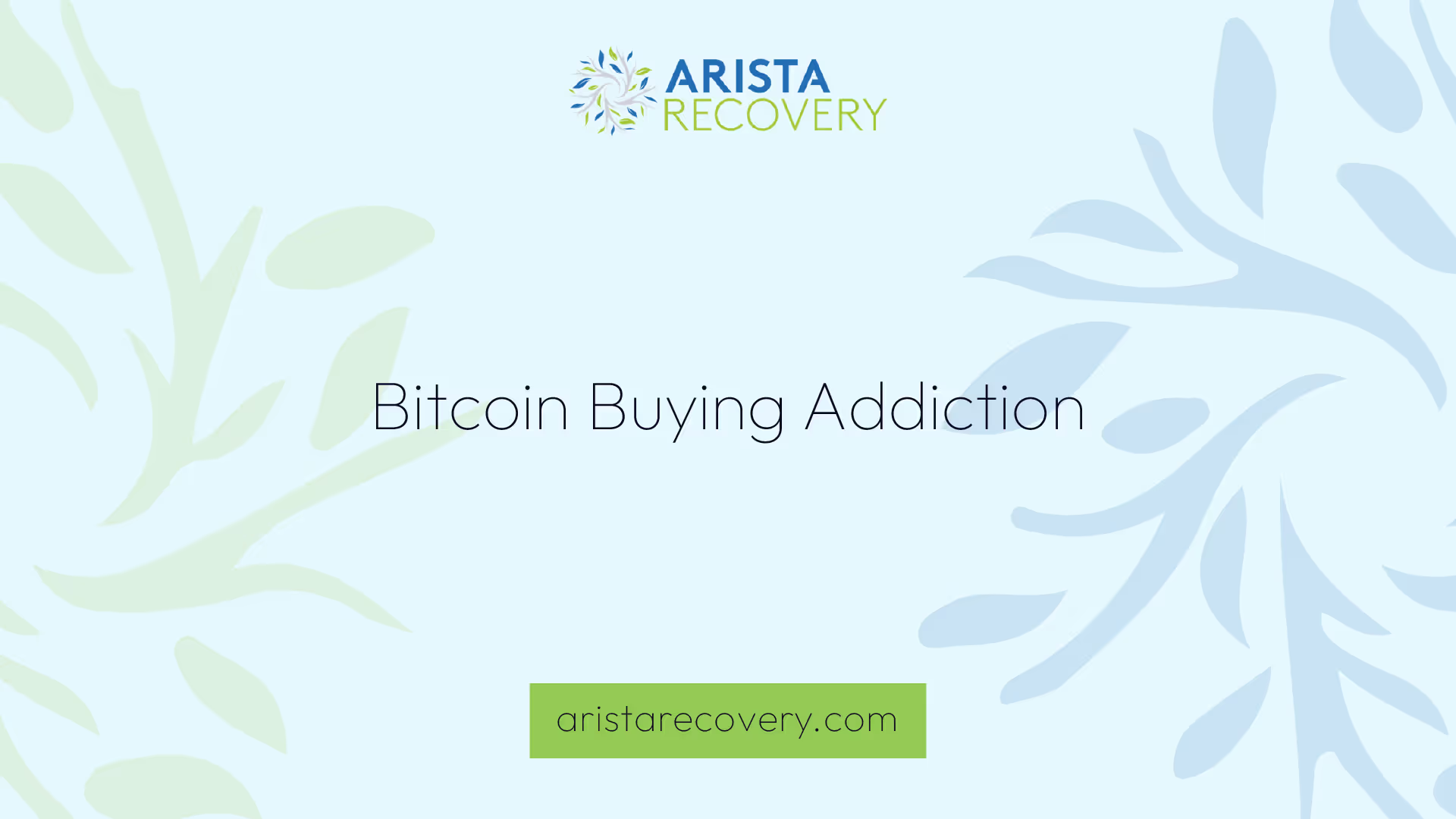Bitcoin Buying Addiction

Understanding Bitcoin Addiction
Bitcoin addiction is an emerging concern in today's digital age, especially with the increasing popularity and accessibility of cryptocurrencies. This section explores the definition of Bitcoin addiction and the factors contributing to it.

Definition of Bitcoin Addiction
Bitcoin addiction refers to a compulsive and excessive preoccupation with buying and trading Bitcoin, leading to negative consequences in various aspects of individuals' lives. This addiction can have a significant impact on mental, emotional, and financial well-being, causing distress and strain in a person's life. The repercussions can be severe, including excessive spending on Bitcoin, the accumulation of debt, and significant financial losses due to the volatile nature of cryptocurrencies [1].
Factors Contributing to Bitcoin Addiction
Several factors contribute to the development of Bitcoin addiction. These include impulsivity, risk-taking behavior, and a susceptibility to addictive behaviors [2]. The Fear of Missing Out (FOMO) and addiction transfer from other behaviors, such as gambling addiction, are also significant contributors.
In addition, the volatile nature of cryptocurrency markets can lead to the release of "feel good" neurotransmitters like dopamine in the brain, contributing to the addictive nature of cryptocurrency trading. The anticipation of potential profits and the thrill of making risky investments can further stimulate the release of dopamine, reinforcing the addictive cycle.
Understanding the factors contributing to Bitcoin addiction is crucial for preventing and treating this condition. It is important to recognize and address these issues early on to mitigate the negative consequences and promote healthier financial behaviors. Seeking professional help and support can be a vital step in overcoming Bitcoin addiction.
Impact of Bitcoin Addiction
Like other forms of addiction, bitcoin buying addiction can have severe consequences on various aspects of an individual's life, including their financial stability, mental and emotional well-being, and personal relationships.
Financial Consequences
Bitcoin addiction can lead to severe financial repercussions. Individuals who are addicted to bitcoin may become obsessed with buying and trading cryptocurrencies, often neglecting other financial responsibilities. The constant need to invest more money into bitcoin can lead to excessive spending and significant debt. Moreover, the volatile nature of cryptocurrencies can result in substantial financial losses, leaving individuals in dire financial situations. This underscores the need for responsible investment and understanding the risks involved in cryptocurrency trading.
Mental and Emotional Well-being
The impact of bitcoin addiction extends beyond financial consequences. It can also take a toll on a person's mental and emotional well-being. The constant obsession with bitcoin can lead to high levels of stress, anxiety, and even depression. The fear of missing out (FOMO) on potential gains or the fear of losing invested money can create intense emotional distress. Additionally, individuals may experience feelings of guilt, shame, or self-blame if their bitcoin investments do not yield the desired outcome. These emotional challenges emphasize the importance of awareness and understanding about the risks associated with bitcoin buying addiction.
Strained Relationships
Bitcoin addiction can also have a profound impact on personal relationships. The intense focus on bitcoin can lead to a neglect of personal relationships, as individuals may prioritize their investments over spending time with loved ones. Financial disagreements and arguments related to bitcoin can also arise, causing further tension and conflict within relationships. This strain on relationships can lead to feelings of isolation and can contribute to the deterioration of support networks. This highlights the importance of seeking appropriate help and support to address the challenges associated with bitcoin addiction.
Signs and Symptoms of Bitcoin Addiction
Recognizing the signs and symptoms of bitcoin buying addiction is crucial for early identification and intervention. Bitcoin addiction refers to a compulsive and excessive preoccupation with buying and trading Bitcoin, leading to negative consequences in various aspects of individuals' lives.
Preoccupation with Bitcoin
An overwhelming preoccupation with Bitcoin-related activities is one of the primary signs of Bitcoin addiction. This can manifest in various ways, such as spending excessive amounts of time researching, buying, selling, or trading Bitcoin. Individuals may find it difficult to control their urges to engage in these activities, even when they have negative impacts on their lives. According to the Family Addiction Specialist, investing and trading Bitcoin can be highly stimulating, mood-altering, and addictive due to extreme euphoric highs and devastatingly intense lows.
Neglect of Responsibilities
Bitcoin addiction can also lead to neglect of other responsibilities. This can include ignoring work or school obligations, personal relationships, and self-care in favor of Bitcoin-related activities. Bitcoin addiction can strain relationships with family, friends, and partners. Neglect of personal relationships, financial disagreements, and arguments related to Bitcoin can cause tension, conflict, and feelings of isolation.
Financial Problems
Financial problems are a common symptom of Bitcoin addiction. This can include excessive spending on Bitcoin, the accumulation of debt, and significant financial losses. The volatile nature of cryptocurrencies can worsen these financial situations. Approximately 1% of cryptocurrency traders are likely to develop a severe pathological addiction to it, and up to 10% will experience problems beyond mere financial loss.
It's important to be aware of these signs and symptoms and to seek professional help if experiencing these symptoms. Bitcoin addiction can have profound effects on an individual's mental and emotional health, relationships and social well-being, as well as financial stability. It can lead to heightened anxiety, stress, depression, strained relationships, and significant financial losses.
Treatment for Bitcoin Addiction
Addressing Bitcoin addiction requires a comprehensive approach that includes professional intervention, peer support, and self-help strategies. These methods aim to regain control over buying habits and mitigate the negative consequences associated with this addiction.
Seeking Professional Help
Early identification and intervention are crucial to effectively manage Bitcoin addiction. Professional counseling and therapy can provide the necessary guidance and support needed to overcome this addiction. Cognitive-behavioral therapy (CBT) is a common therapeutic approach used to treat addiction. It helps individuals develop healthier habits and coping mechanisms to manage compulsive Bitcoin buying and trading habits.
In addition to CBT, other therapeutic interventions may include motivational interviewing, family therapy, and medications, among others. The choice of therapy depends on the individual's specific needs and circumstances. It's important to seek help early if experiencing symptoms such as difficulty controlling urges to engage in Bitcoin-related activities, neglecting other responsibilities, experiencing financial losses, and high levels of stress, anxiety, and depression.
Support Groups and Peer Counseling
Support groups and peer counseling can also play a significant role in the treatment of Bitcoin addiction. These platforms provide a supportive environment for individuals to share their experiences, challenges, and successes with others who are going through a similar journey. The shared experiences can foster a sense of community, reduce feelings of isolation, and provide practical tips and strategies to manage the addiction.
There are various online and offline support groups available that focus on addiction to Bitcoin and other cryptocurrencies. Joining these groups can provide crucial emotional support and encouragement during the recovery journey.
Self-Help Strategies
In addition to professional help and peer support, incorporating self-help strategies into the recovery process can further aid in managing Bitcoin addiction. These strategies may include setting clear boundaries around Bitcoin buying and trading, implementing a structured daily routine, practicing stress management techniques, and seeking out healthy hobbies and recreational activities.
Moreover, developing a realistic and sustainable financial plan can help manage the financial repercussions of Bitcoin addiction. This may involve setting spending limits, creating a debt repayment plan, and seeking financial counseling if needed.
Bitcoin addiction can have profound effects on an individual's life, impacting mental and emotional health, relationships, and financial stability. Therefore, it's essential to seek appropriate help and support, and adopt effective strategies to overcome this addiction and restore balance to one's life.
Dark Tetrad Traits and Crypto Attitudes
Psychological factors can play a significant role in shaping an individual's attitudes towards cryptocurrencies and their buying intentions. An intriguing area of study is the impact of the Dark Tetrad traits - Machiavellianism, subclinical narcissism, subclinical psychopathy, and subclinical sadism - on a person's attitude towards cryptocurrencies like bitcoin and their buying intentions.
Effect of Dark Tetrad on Crypto Attitude
Research has shown that Dark Tetrad traits, especially narcissism, can influence an individual's attitude towards cryptocurrencies. Specifically, narcissism is positively associated with a favorable attitude towards crypto, mediated by positivity. This means individuals with narcissistic traits may have a higher likelihood of viewing cryptocurrencies in a positive light, contributing to bitcoin buying addiction [5].
On the other hand, psychopathy can impact crypto judgments through the Fear of Missing Out (FoMO) and a negative effect on positivity. Essentially, individuals with psychopathic traits may feel compelled to invest in cryptocurrencies due to a fear of missing out on potential gains, even if they have a negative outlook on the asset class.
Interestingly, sadism is not expected to be associated with crypto judgments as buying crypto is unlikely to directly result in another's distress [5].
Influence on Buying Intention
In terms of buying intentions, Machiavellianism plays a significant role. The research shows that Machiavellianism is associated with buying intention, which is mediated by conspiracy beliefs. This suggests that individuals with Machiavellian traits, characterized by manipulation and a disregard for morality, may be more likely to invest in cryptocurrencies if they believe in conspiracy theories surrounding traditional financial systems.
By understanding the influence of Dark Tetrad traits on crypto attitudes and buying intentions, it becomes easier to comprehend why some individuals may develop a bitcoin buying addiction. This also highlights the importance of considering psychological factors when addressing issues related to cryptocurrency investment and addiction.
Media Influence and Regulation
In the context of Bitcoin buying addiction, it's crucial to understand two key aspects that can significantly impact this behavior: media influence and government regulation. The role media plays in shaping public perceptions and behavior towards cryptocurrencies, and the importance of government regulation in promoting responsible investment practices.
Role of Media in Bitcoin Addiction
The media plays a significant role in fueling Bitcoin buying addiction. It often shapes public perception and behavior regarding cryptocurrencies, including Bitcoin. The constant coverage of Bitcoin's price fluctuations, potential for massive price increases, and associated news can lead to a continuous desire to check price action and monitor cryptocurrency news.
Furthermore, the volatile nature of cryptocurrency markets, covered extensively by the media, can lead to the release of "feel good" neurotransmitters like dopamine in the brain. This contributes to the addictive nature of cryptocurrency trading.
The media's role in promoting the hype and excitement around Bitcoin, including its cyclical price trends based on the halving of Bitcoin production that occurs approximately every 4 years, can make it appealing and addictive to many traders.
Government Regulation and Responsible Investment
On the other hand, government regulation plays a crucial role in mitigating the risks associated with Bitcoin buying addiction. By implementing and enforcing rules and guidelines, government bodies can promote responsible investment practices and protect vulnerable individuals from falling into the trap of addiction.
Regulation can come in various forms, including limiting the amount of investment in cryptocurrencies, enforcing stricter rules on cryptocurrency exchanges, or providing educational resources to the public about the potential risks and benefits of investing in Bitcoin.
Through a combination of media awareness and government regulation, society can better navigate the complex world of Bitcoin and mitigate the risk of Bitcoin buying addiction. As with any form of investment, it's always important to do proper research, understand the potential risks involved, and invest responsibly.
References
[1]: https://www.townsendla.com/blog/bitcoin-buying-addiction
[2]: https://www.northstarbehavioralhealthmn.com/resources/bitcoin-buying-addiction
[3]: https://www.familyaddictionspecialist.com/blog/staring-at-charts-bitcoin-and-cryptocurrency-addiction/
[4]: https://www.newhorizonscenterspa.org/blog/bitcoin-addiction
[5]: https://www.sciencedirect.com/science/article/abs/pii/S0191886921008321
[6]: https://www.urbanrecovery.com/blog/bitcoin-buying-addiction/
When mental health challenges and addiction intersect, it can feel isolating. At Arista, we offer compassionate, evidence-based, and trauma-informed care to help you heal, grow, and move forward.
You’re not alone in this.
When mental health challenges and addiction intersect, it can feel isolating. At Arista, we offer compassionate, evidence-based, and trauma-informed care to help you heal, grow, and move forward.
Support that moves with you.
You’ve taken a brave first step. At Arista Recovery, we’re here to help you continue with best-in-class care designed for long-term healing and support.
.webp)






